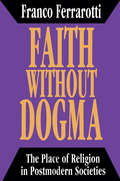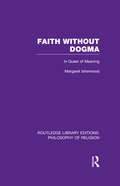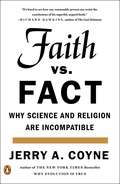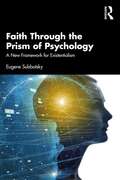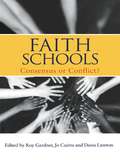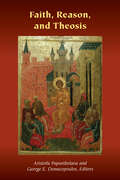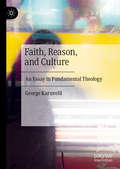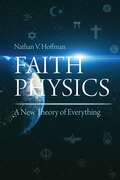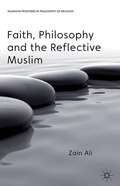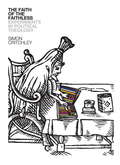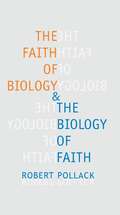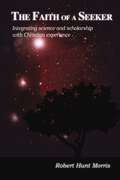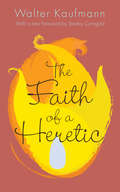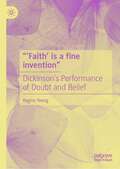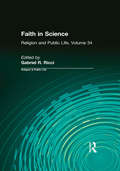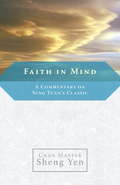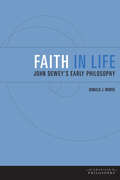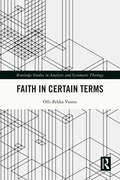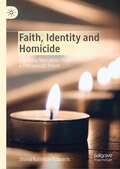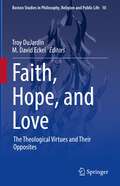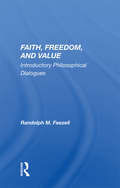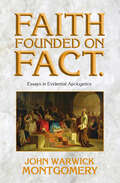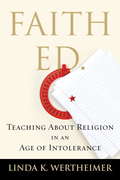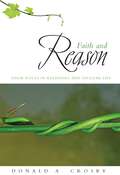- Table View
- List View
Faith without Dogma: Place of Religion in Postmodern Societies
by Franco FerrarottiWe live in a time of high Church membership, but low Church attendance. Franco Ferrarotti, arguably the most important sociologist of religion alive, captures the source of this paradox In the title of his new book, Faith without Dogma. For it is belief that propels membership, while the absence of dogma results in a reticence to accept hierarchical direction from above or beyond.Basing much of his analysis on the postwar struggles within Roman Catholicism, Ferrarotti views the demand for religious renewal and revival as part and parcel of the emergence of broad social agendas—agendas to which not even the Roman curia could remain impervious. The former easy relationships between Church and State, especially authoritarian states in Europe and Latin America, gave way to a critical defense of individual rights within a context of a broadened vision of Christian doctrine.In addition to issues Involved in internal affairs of religion, Ferrarotti explores a series of developments that have changed for all time the nature of Church survival. The critical element, one that goes beyond specific doctrinal accommodations, is the new primary connection of Church to people rather than Church to State. This came about through the widespread acceptance of science and technology as frames of intellectual reference, the emergence of secularization as mediating religious claims and the creation from the Enlightenment to the Postmodern eras of "civil religions."The volume concludes with a set of chapters on the nature of sacred events and objects, the emergence of new varieties of prayer, and concludes with a chapter on the relationship of ideology to theology prepared especially for the English language edition of Faith without Dogma. This is a book likely to attract a broad audience among religionists and culturologists, as well as social scientists.
Faith Without Dogma: In Quest of Meaning (Routledge Library Editions: Philosophy of Religion)
by Margaret IsherwoodLife is a constant search for meaning, and reflective minds need to find deeper and more comprehensive meaning than that normally proffered by the orthodox teaching of any creedal religion. When this book was initially published in 1964, religion had begun to recognize the importance of psychology and psychology had considered a spiritual principle in man. Miss Isherwood’s purpose in writing this book is to relate science and religion more closely. Her theme is that the evolution of consciousness from protozoa provides a link which not only gives grounds for faith in life and an inspiration for carrying development forward, but which reveals that, as we continuously work at deepening our insight into the realms of spirit, the life process appears to us as steadily more meaningful. Her engaging writing style makes this a fascinating glimpse at a philosophy of religion starting to engage with science.
Faith Versus Fact
by Jerry A. CoyneThe New York Times bestselling author explains why any attempt to make religion compatible with science is doomed to fail In his provocative new book, evolutionary biologist Jerry A. Coyne lays out in clear, dispassionate detail why the toolkit of science, based on reason and empirical study, is reliable, while that of religion--including faith, dogma, and revelation--leads to incorrect, untestable, or conflicting conclusions. Coyne is responding to a national climate in which over half of Americans don't believe in evolution (and congressmen deny global warming), and warns that religious prejudices and strictures in politics, education, medicine, and social policy are on the rise. Extending the bestselling works of Richard Dawkins, Daniel Dennett, and Christopher Hitchens, he demolishes the claims of religion to provide verifiable "truth" by subjecting those claims to the same tests we use to establish truth in science. Coyne irrefutably demonstrates the grave harm--to individuals and to our planet--in mistaking faith for fact in making the most important decisions about the world we live in.
Faith Versus Fact: Why Science and Religion Are Incompatible
by Jerry A. CoyneThe New York Times bestselling author explains why any attempt to make religion compatible with science is doomed to fail In his provocative new book, evolutionary biologist Jerry A. Coyne lays out in clear, dispassionate detail why the toolkit of science, based on reason and empirical study, is reliable, while that of religion--including faith, dogma, and revelation--leads to incorrect, untestable, or conflicting conclusions. Coyne is responding to a national climate in which over half of Americans don't believe in evolution (and congressmen deny global warming), and warns that religious prejudices and strictures in politics, education, medicine, and social policy are on the rise. Extending the bestselling works of Richard Dawkins, Daniel Dennett, and Christopher Hitchens, he demolishes the claims of religion to provide verifiable "truth" by subjecting those claims to the same tests we use to establish truth in science. Coyne irrefutably demonstrates the grave harm--to individuals and to our planet--in mistaking faith for fact in making the most important decisions about the world we live in.
Faith Through the Prism of Psychology: A New Framework for Existentialism
by Eugene SubbotskyFaith Through the Prism of Psychology introduces readers to the structure and function of the inherent ability of our Self to invest objects with reality — existentialization (EXON). The author moves away from traditional ideas of existence and faith, arguing that it is an inherent ability of an individual mind to invest entities (both objective and subjective) with reality. The book treats faith as a psychological ability of the mind to upgrade the existential statuses of imaginary entities, such as ghosts or gods; the working of faith is operationalized and analyzed in empirical psychological studies. It presents a new model of investing objects with existence, with such structural elements as the belief in object permanence (BOP), magic/ordinary distinguisher (MOD), magic/trick distinguisher (MTD), imaginary/perceived distinguisher (IPD), BOP defense mechanism (BOP/DM) and realities distinguisher (RD). It will be essential reading for anyone interested in existence from psychology, philosophy, art, theology or psychotherapy backgrounds.
Faith Schools: Consensus or Conflict?
by Roy Gardner Jo Cairns Denis LawtonUntil fairly recently the separation of pupils according to religion was felt to be compatible with a comprehensive education. That consensus no longer holds and there is a strong positive lobby either to absorb faith schools altogether within the state system or at least to dilute their membership ensuring they include children from other faiths, or no faith at all. This book addresses the current concerns, questions and interest surrounding the legitimacy, support and intended expansion of faith schools. Divided into five sections, it includes chapters on: * the legal frameworks for faith schools and the rights of the child* faith-based schools in the UK, Northern Ireland, France and the USA* the impact of faith schools on pupil performance* faith schools, religious education and citizenship* political and research issues. Faith Schools: Consensus or Conflict? is of interest to educators, policymakers, researchers and students of education, religion and sociology.
Faith, Reason, and Theosis (Orthodox Christianity and Contemporary Thought)
by William J. Abraham Peter C. Bouteneff Carolyn Chau Robert Glenn Davis Stephen J. Davis David Bentley Hart Philip Kariatlis Jean Porter Andrew Prevot Ashley M. Purpura Kirsi Stjerna Michele Watkins Rowan Williams Aristotle PapanikolaouTheosis shapes contemporary Orthodox theology in two ways: positively and negatively. In the positive sense, contemporary Orthodox theologians made theosis the thread that bound together the various aspects of theology in a coherent whole and also interpreted patristic texts, which experienced a renaissance in the twentieth century, even in Orthodox theology. In the negative sense, contemporary theologians used theosis as a triumphalistic club to beat down Catholic and Protestant Christians, claiming that they rejected theosis in favor of either a rationalistic or fideistic approach to Christian life.The essays collected in this volume move beyond this East–West divide by examining the relation between faith, reason, and theosis from Orthodox, Catholic, and Protestant perspectives. A variety of themes are addressed, such as the nature–grace debate and the relation of philosophy to theology, through engagement with such diverse thinkers as Thomas Aquinas, John Wesley, Meister Eckhart, Dionysius the Areopagite, Symeon the New Theologian, Panayiotis Nellas, Vladimir Lossky, Martin Luther, Martin Heidegger, Sergius Bulgakov, John of the Cross, Delores Williams, Evagrius of Pontus, and Hans Urs von Balthasar. The essays in this book are situated within a current thinking on theosis that consists of a common, albeit minimalist, affirmation amidst the flow of differences. The authors in this volume contribute to the historical theological task of complicating the contemporary Orthodox narrative, but they also continue the “theological achievement” of thinking about theosis so that all Christian traditions may be challenged to stretch and shift their understanding of theosis even amidst an ecumenical celebration of the gift of participation in the life of God.
Faith, Reason, and Culture: An Essay in Fundamental Theology
by George KaruvelilIn this book, George Karuvelil seeks to establish the rationality of religion and theology in the contemporary world. Theology has always required some philosophical basis. Moreover, Christian theology has had a dynamic character that enabled it to adapt to more than one philosophy depending on the need of the time. For instance, it shifted in accordance with the change from Neo-Platonism to Aristotelianism in the thirteen century. However, this dynamism has been absent since the dawn of modernity, when reason became identified with modern science to disastrous results. While the advent of postmodernism has brought the limits of modernism to light, it has done nothing to establish the rationality of religion, other than to treat religion as a cultural phenomenon along with science. This book conceives fundamental theology as a discipline that seeks religious truth in the midst of diverse perspectives, ranging from militant atheism to violent religious fanaticism.
Faith Physics: A New Theory of Everything
by Nathan V HoffmanFaith Physics is a new Theory of Everything (ToE) combining ancient spiritual wisdom and modern quantum physics findings to deliver a belief system that is both intellectually sound and spiritually satisfying. It maintains an ineffable Supreme Con
Faith, Philosophy and the Reflective Muslim
by Zain AliMost modern literature on the rationality of religious belief is primarily written from Christian and Secular perspectives, the introduction of a reflective Muslim perspective provides a fresh and alternative perspective. This work aims to pioneer an engagement with contemporary philosophical scholarship from the perspective of a reflective Muslim
The Faith of the Faithless
by Simon CritchleyThe return to religion has perhaps become the dominant cliché of contemporary theory, which rarely offers anything more than an exaggerated echo of a political reality dominated by religious war. Somehow, the secular age seems to have been replaced by a new era, where political action flows directly from metaphysical conflict. The Faith of the Faithless asks how we might respond. Following Critchley's Infinitely Demanding, this new book builds on its philosophical and political framework, also venturing into the questions of faith, love, religion and violence. Should we defend a version of secularism and quietly accept the slide into a form of theism--or is there another way?From Rousseau's politics and religion to the return to St. Paul in Taubes, Agamben and Badiou, via explorations of politics and original sin in the work of Schmitt and John Gray, Critchley examines whether there can be a faith of the faithless, a belief for unbelievers. Expanding on his debate with Slavoj i ek, Critchley concludes with a meditation on the question of violence, and the limits of non-violence.
The Faith of Biology and the Biology of Faith: Order, Meaning, and Free Will in Modern Medical Science (Leonard Hastings Schoff Lectures)
by Robert PollackAre there parallels between the "moment of insight" in science and the emergence of the "unknowable" in religious faith? Where does scientific insight come from? Award-winning biologist Robert Pollack argues that an alliance between religious faith and science is not necessarily an argument in favor of irrationality: the two can inform each other's visions of the world.Pollack begins by reflecting on the large questions of meaning and purpose—and the difficulty of finding either in the orderly world described by the data of science. He considers the obligation to find meaning and purpose despite natural selection's claim to be a complete explanation of our presence as a species—a claim that calls upon neither natural intention, nor design, nor Designer. Next, the book focuses on matters of free will, from the choice of a scientist to accept evidence, to the choice of a religious person to accept a revelation, to a patient's loss of free will in medical treatment. Here Pollack addresses questions of ethics and offers a provocative comparison of two difficult texts whose contents remain incompletely understood: the DNA "text" of the human genome and the Hebrew record of Jewish written and oral law. In closing, Pollack considers the promise of genetic medicine in enabling us to glimpse our own future and offers a reconsideration of the possible utility of the so-called placebo effect in curing illness.Whether refuting a DNA-based biological model of Judaism or discussing the Darwinian concept of the species, Pollack, under the banner of free inquiry, presents a genuine, vital, and well-argued assay of the intersection of science and religion.
The Faith of a Seeker: Integrating Science and Scholarship with Christian Experience
by Robert H. MorrisIn The Faith of a Seeker, the author draws upon his lifelong search for truth and understanding, trying to face squarely the difficult issues of faith and science and those raised by biblical criticism. After an introductory essay on seeking and the seeker, he turns to recent ideas and findings in cosmology and how they relate to biblical faith. He then devotes three full chapters to biological evolution and to the relation of humans to apes, taking the best books available on both sides of the issue and setting their arguments side by side. After finding what he feels is sufficient evidence for the biblical God, he then makes his own arguments for the being and nature of God, followed by a lengthy chapter on Jesus and a short one on the Holy Spirit, then a study of the Bible itself. The final chapters are: “The Supernatural”; “Our Human Condition”; “A Seeker’s Life of Faith”; “Concluding Remarks.”
The Faith of a Heretic
by Walter Kaufmann Stanley CorngoldOriginally published in 1959, The Faith of a Heretic is the most personal statement of the beliefs of Nietzsche biographer and translator Walter Kaufmann. A first-rate philosopher in his own right, Kaufmann here provides the fullest account of his views on religion. Although he considered himself a heretic, he was not immune to the wellsprings and impulses from which religion originates, declaring it among the most vital and radical expressions of the human mind. Beginning with an autobiographical prologue that traces his evolution from religious believer to "heretic," the book touches on theology, organized religion, morality, suffering, and death--all examined from the perspective of a "quest for honesty." Kaufmann also subjects philosophy's faith in truth, reason, and absolute morality to the same heretical treatment. The resulting exploration of the faiths of a nonbeliever in a secular age is as fresh and challenging as when it was first published.<P><P>In a new foreword, Stanley Corngold vividly describes the intellectual and biographical milieu of Kaufmann's provocative book.
“‘Faith’ is a fine invention”: Dickinson’s Performance of Doubt and Belief
by Regina YoongThis book covers nineteenth-century American poet Emily Dickinson who captured the multifaceted nature of life in all of its uncertainties. Studies on her exploration of faith are ample, but in this book, the author uncovers Dickinson’s playful role-play in enacting solemn themes of religion, death, and the unknown. Dickinson’s creativity encompasses not only her use of language but also her poetic personae and self-created poetic stages inviting readers to question, contemplate deeply or even poke fun at life's absurdities. By using performative roles such as the rejected outcast, passive supplicant, and playful warrior, Dickinson unveils--through a paradoxical framework of belief and unbelief-- a line of inquiry that is multifocal and erratic to “tell all the truth and tell it slant.”
Faith in Science (Religion And Public Life Ser. #Vol. 34)
by Gabriel R. RicciThere is growing academic interest in addressing the relationship of religion and science. There are also very generous funding sources that encourage scientists to demonstrate the reality of purpose in the world. Still, there are organizations offering support to community groups dedicated to discussing religion and science. Contributors explore this development in Faith in Science. The intellectual initiatives analyzed here seem far removed from the deep religious and cultural divisions that dominate the contemporary geopolitical landscape. This emerging industry, however, originates in a cultural debate that set the evolutionary view of Nature against revelation's conception of Nature as the fulfillment of God's creation. The two worldviews are hopelessly mismatched, although scientific creationism purports to have uncovered scriptural evidence that invites another look. Along the way, the imposition of theological themes onto the geological record became a tendency for many naturalists. Peter Medawar's scathing review of Teilhard de Chardin's The Phenomenon of Man in 1961 remains as a warning for those who mix Darwinian orthodoxy and theological parlance. The challenge, Medawar would have us believe, is not to abandon the exacting methods and logic of science in favor of a poetic dream of how consciousness is a manifestation of energy. But does this mean that science and religion are only methodologically demarcated? Must we insist on the traditional boundaries instituted by scientific conventions and religious beliefs? From various historical, religious, and scientific vantage points, contributors to this volume, who include Guy Consolmagno, Donald Kraybill, David Ray Griffin, Gerald L. Schroeder, Robert Pollack, Robert Pennock, Carol Wayne Wright, Bill Durbin, Kathleen Duffy, and Anthony Matteo, take up these challenges.
Faith in Mind: A Commentary on Seng Ts'an's Classic
by Master Sheng YenThe Supreme Way is not difficultIf only you do not pick and choose.Neither love nor hate,And you will clearly understand.Be off by a hair,And you are as far from it as heaven and earth. These vivid lines begin one of the most beloved and commented upon of all Zen texts, the Hsin Hsin Ming ("Faith in Mind"), a sixth-century poem by the third Chan patriarch, Seng Ts'an. The Hsin Hsin Ming is a masterpiece of economy, expressing the profoundest truth of the enlightened mind in only a few short pages. Master Sheng Yen's approach is unique among commentaries on the text: he views it as a supremely useful and practical guide to meditation practice. "I do not adopt a scholarly point of view or analytical approach," he says. "Rather, I use the poem as a taking-off point to inspire the practitioner and deal with issues that arise during the course of practice. True faith in mind is the belief grounded in realization that we have a fundamental, unmoving, and unchanging mind. This mind is precisely Buddha mind."
Faith in Life: John Dewey's Early Philosophy (American Philosophy)
by Donald J. MorseThis is the first book to consider John Dewey’s early philosophy on its own terms and to explicate its key ideas. It does so through the fullest treatment to date of his youthful masterwork, the Psychology. This fuller treatment reveals that the received view, which sees Dewey’s early philosophy as unimportant in its own right, is deeply mistaken. In fact, Dewey’s early philosophy amounts to an important new form of idealism. More specifically, Dewey’s idealism contains a new logic of rupture, which allows us to achieve four things:• A focus on discontinuity that challenges all naturalistic views, including Dewey’s own later view; • A space of critical resistance to events that is at the same time the source of ideals;• A faith in the development of ideals that challenges pessimists like Schopenhauer and Nietzsche; and • A non-traditional reading of Hegel that invites comparison with cutting-edge Continental philosophers, such as Adorno, Derrida, and Zizek, and even goes beyond them in its systematic approach;In making these discoveries, the author forges a new link between American and European philosophy, showing how they share similar insights and concerns. He also provides an original assessment of Dewey’s relationship to his teacher, George Sylvester Morris, and to other important thinkers of the day, giving us a fresh picture of John Dewey, the man and the philosopher, in the early years of his career. Readers will find a wide range of topics discussed, from Dewey’s early reflections on Kant and Hegel to the nature of beauty, courage, sympathy, hatred, love, and even death and despair. This is a book for anyone interested in the thought of John Dewey, American pragmatism, Continental Philosophy, or a new idealism appearing on the scene.
Faith in Certain Terms (Routledge Studies in Analytic and Systematic Theology)
by Olli-Pekka VainioThis book considers how certainty and faith are related in the Christian faith. It asks: How certain can Christian believers be about their beliefs about God? Should Christians doubt the assurance of their salvation? The chapters provide a historical analysis of both certainty of faith and assurance from the early Church to modern times while also paying attention to confessional differences. The author explores contemporary debates in analytic epistemology on the certainty and fallibility of our beliefs and argues for a fallibilist understanding of Christian faith. The book also addresses some less-discussed arguments that threaten the certainty of faith and offers an account of faith as cognitive practice. It will be of interest to scholars of both theology and philosophy.
Faith, Identity and Homicide: Exploring Narratives from a Therapeutic Prison
by Shona Robinson-EdwardsThis book explores the role that religion plays in the lives of imprisoned homicide offenders. Drawing on interviews in an English prison, the author examines how they narrate their life stories and how religion intersects with other categories to rebuild their personal identities after committing a crime and being labelled as murderers or killers. This book seeks to bridge the gap between macro and micro phenomena, examining religion as both a social institution and a personal experience. It also explores the mediating role of institutions with regards to the nature and extent of their influence upon individual choices and actions, and provides insights into the nature of the therapeutic prison. It seeks to create some clarity of understanding the complex nature of religiosity, narrative, identity, desistance and rehabilitation whilst critically examining elements of social identity that may restrict or enhance this process. It provides a series of recommendations for organisations working with convicted homicide offenders/offenders and speaks to academics and practitioners in the fields of criminology, sociology, psychology and religious/theological studies.
Faith, Hope, and Love: The Theological Virtues and Their Opposites (Boston Studies in Philosophy, Religion and Public Life #10)
by Troy DuJardin M. David EckelThese essays consider the three traditional theological virtues—faith, hope, and love—alongside their opposites—doubt, despair, and hate, from a scholarly perspective. The volume includes contributions not just from philosophers of religion, but also from psychologists, sociologists, and film and literature scholars, to paint a complex and nuanced picture of these virtues, both of how we might understand them, and how we can hope to embody them ourselves. While these virtues make up a core part of the Christian tradition, the chapters here go far and wide in search of different cultural conceptions of these universal human concerns. Inquiries are made into these virtues within Hindu, Buddhist, Jewish, and Islamic thought, alongside philosophers including Aristotle, Hegel, Kierkegaard, Nietzsche, Levinas, and Murdoch. The resulting tapestry is often beautiful, sometimes horrific, but always thoroughly human. This text appeals to students and researchers working in these fields. Chapter [9] is available open access under a Creative Commons Attribution 4.0 International License via link.springer.com.
Faith, Freedom, And Value: Introductory Philosophical Dialogues
by Randolph M. FeezellThis book contains a series of philosophical conversations between two old college friends and provides a readable and clear examination of certain fundamental philosophical questions. It shows introductory students some of the standard arguments in the history of philosophy.
Faith Founded on Fact: Essays in Evidential Apologetics
by John Warwick MontgomeryA provocative and controversial book intended to encourage Christian to make the case for the truthfulness of Christianity based on factual evidence. Included are chapters on: The Place of Reason in Christian Witness; Science, Theology, and the Miraculous; How Muslims Do Apologetics;, Dr. Johnson as Apologist. Contains the most sophisticated refutation available anywhere of the arguments of David Hume and Anthony Flew against miracles in general and the resurrection of Christ in particular.
Faith Ed
by Linda K. WertheimerAn intimate cross-country look at the new debate over religion in the public schools A suburban Boston school unwittingly started a firestorm of controversy over a sixth-grade field trip. The class was visiting a mosque to learn about world religions when a handful of boys, unnoticed by their teachers, joined the line of worshippers and acted out the motions of the Muslim call to prayer. A video of the prayer went viral with the title "Wellesley, Massachusetts Public School Students Learn to Pray to Allah." Charges flew that the school exposed the children to Muslims who intended to convert American schoolchildren. Wellesley school officials defended the course, but also acknowledged the delicate dance teachers must perform when dealing with religion in the classroom.Courts long ago banned public school teachers from preaching of any kind. But the question remains: How much should schools teach about the world's religions? Answering that question in recent decades has pitted schools against their communities.Veteran education journalist Linda K. Wertheimer spent months with that class, and traveled to other communities around the nation, listening to voices on all sides of the controversy, including those of clergy, teachers, children, and parents who are Muslim, Jewish, Christian, Sikh, or atheist. In Lumberton, Texas, nearly a hundred people filled a school-board meeting to protest a teacher's dress-up exercise that allowed freshman girls to try on a burka as part of a lesson on Islam. In Wichita, Kansas, a Messianic Jewish family's opposition to a bulletin-board display about Islam in an elementary school led to such upheaval that the school had to hire extra security. Across the country, parents have requested that their children be excused from lessons on Hinduism and Judaism out of fear they will shy away from their own faiths.But in Modesto, a city in the heart of California's Bible Belt, teachers have avoided problems since 2000, when the school system began requiring all high school freshmen to take a world religions course. Students receive comprehensive lessons on the three major world religions, as well as on Sikhism, Hinduism, Buddhism, and often Shintoism, Taoism, and Confucianism. One Pentecostal Christian girl, terrified by "idols," including a six-inch gold Buddha, learned to be comfortable with other students' beliefs. Wertheimer's fascinating investigation, which includes a return to her rural Ohio school, which once ran weekly Christian Bible classes, reveals a public education system struggling to find the right path forward and offers a promising roadmap for raising a new generation of religiously literate Americans.
Faith and Reason: Their Roles in Religious and Secular Life
by Donald A. CrosbyFew words are as widely misconceived as the word "faith." Faith is often set in stark opposition to reason, considered antithetical to scientific thought, and heavily identified with religion. Donald Crosby's revealing book provides a more complex picture, discussing faith and its connection to the whole of human life and human knowledge. Crosby writes about that existential faith that underlies, shapes, and supports a person's life and its sense of purpose and direction. Such faith does not make a person religious and being secular does not mean one rejects all forms of faith. Throughout the book Crosby makes the case that faith is fundamentally involved in all processes of reasoning and that reason is an essential part of all dependable forms of faith.Crosby elaborates the major components of faith and goes on to look at the mutually dependent relationships between faith and knowledge, faith and scientific knowledge, and faith and morality. The work's final chapters examine crises of faith among several noted thinkers as well as the author's own journey of faith from plans for the ministry to pastor to secular philosopher and religious naturalist.
